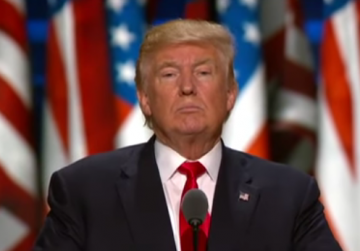Horowitz: Trump Rallies are Political Double-Edged Sword
Tuesday, October 23, 2018
Rob Horowitz, GoLocalWorcester MINDSETTER™
 As anyone with a television who even casually watches news programming knows, President Trump is holding rally after rally in the closing weeks of the mid-term elections in an effort to motivate his supporters to vote. The impact of the president’s energetic and aggressive campaigning, however, will in all likelihood not be an unvarnished plus: it is much more likely to be best characterized as a political double-edged sword.
As anyone with a television who even casually watches news programming knows, President Trump is holding rally after rally in the closing weeks of the mid-term elections in an effort to motivate his supporters to vote. The impact of the president’s energetic and aggressive campaigning, however, will in all likelihood not be an unvarnished plus: it is much more likely to be best characterized as a political double-edged sword.
Certainly, in the mainly red states with competitive Senate races, where most of the rallies are being held, Trump’s appearances will provide a boost to the Republican Senate candidates he is backing. These are states where the president remains popular and the impact of the rallies are amplified by the fact that they receive saturation local media coverage. For Republican candidates, such as Matt Rosendale in Montana, Ken Cramer in North Dakota, Mike Braun in Indiana, and Patrick Morrisey in West Virginia, who are taking on incumbent Democratic Senators, appearing side by side with the president is a big plus.
But for the swing Congressional districts throughout the nation, where Trump is by and large unpopular, having the president even more front and center, dominating the national media coverage, in the final weeks of the campaign is likely to hurt far more Republican House candidates than it helps.
All mid-term elections are in large measure a referendum on the incumbent president, but given the intense feelings about President Trump, this one is even more so as recent polling documents. While there has been some uptick in Trump’s approval rating, he remains unpopular with far more people strongly disapproving of his performance than strongly approving it.
Among the major drivers of Trump’s unpopularity, despite a strong economy, is his unpresidential demeanor and his reflexive dishonesty. These unappetizing personal qualities are on full display during the rallies. In Montana this past Thursday, for example, Trump praised Representative Greg Gianforte, who body-slammed a reporter last May, for asking the congressman a simple question about health care. Trump exclaimed, “Any guy who can do a body-slam ... he’s my guy.” This comment would be incendiary under any circumstances, but in the wake of a Washington Post columnist Jamal Khashoggi being murdered and dismembered by Saudi Arabian operatives its celebration of violence against a journalist sounded even more outrageous. True to form, Trump's rally remarks continue to be riddled with outright falsehoods, including the fact he is somehow going to get a middle class tax cut passed before the election, even though Congress will not be back to vote on anything until after the election. In Arizona last week, Trump said, "In California, a town council is run by illegal immigrants. Is this even possible?" He was apparently referring to Huntington Park, where 2 undocumented residents were appointed to Town Advisory boards. The City Council-the government decision-making body-- is, of course, comprised of all citizens; in this case they all happen to be Latino Americans.
One of the reasons that the Brett Kavanaugh fight energized a broad cross-section of Republicans and Conservatives is that it wasn’t all about President Trump. Trump's making the last few weeks of the election all about him--and often him at his incendiary worst-- is a mixed blessing for the Republicans at best-- a true political double-edged sword.
Rob Horowitz is a strategic and communications consultant who provides general consulting, public relations, direct mail services and polling for national and state issue organizations, various non-profits and elected officials and candidates. He is an Adjunct Professor of Political Science at the University of Rhode Island.
 Rob Horowitz is a strategic and communications consultant who provides general consulting, public relations, direct mail services and polling for national and state issue organizations, various non-profits and elected officials and candidates. He is an Adjunct Professor of Political Science at the University of Rhode Island.
Rob Horowitz is a strategic and communications consultant who provides general consulting, public relations, direct mail services and polling for national and state issue organizations, various non-profits and elected officials and candidates. He is an Adjunct Professor of Political Science at the University of Rhode Island.

